What’s in a name? People use unique names to address each other, but we’re one of only a handful of animal species known to do that, including bottlenose dolphins. Finding more animals with names and investigating how they use them can improve scientists’ understanding of both other animals and ourselves.
As elephant researchers who have observed free-ranging elephants for years, my colleagues and I get to know wild elephants as individuals, and we make up names for them that help us remember who is who. The elephants in question live fully in the wild and are, of course, unaware of the epithets we apply to them.
But in a new study published in Nature Ecology and Evolution, we found evidence that elephants have their own names that they use to address each other. This research places elephants among the very small number of species known to address one another in this way, and it has implications for scientists’ understanding of animal intelligence and the evolutionary origins of language.
Finding evidence for name-like calls
My colleagues and I had long suspected that elephants might be able to address one another with name-like calls, but no researchers had tested that idea. To explore this question, we followed elephants across the Kenyan savanna, recording their vocalizations and noting, whenever possible, who made each call and whom the call was addressed to.
When most people think of elephant calls, they imagine loud trumpets. But really, most elephant calls are deep, thrumming sounds known as rumbles that are partially below the range of human hearing. We thought that if elephants have names, they most likely say them in rumbles, so we focused on these calls in our analysis.
Elephant rumbles have a deep, sonorous sound.
Michael Pardo236 ko (download)
We reasoned that if rumbles contain something like a name, then we should be able to identify whom a call is intended for based purely on the call’s properties. To determine whether this was the case, we trained a machine learning model to identify the recipient of each call.
We fed the model a series of numbers describing the sound properties of each call and told it which elephant each call was addressed to. Based on this information, the model tried to learn patterns in the calls associated with the identity of the recipient. Then, we asked the model to predict the recipient for a separate sample of calls. We used a total of 437 calls from 99 individual callers to train the model.
Part of the reason we needed to use machine learning for this analysis is because rumbles convey multiple messages at once, including the identity, age and sex of the caller, emotional state and behavioral context. Names are likely only one small component within these calls. A computer algorithm is often better than the human ear at detecting such complex and subtle patterns.
We didn’t expect elephants to use names in every call, but we had no way of knowing…



